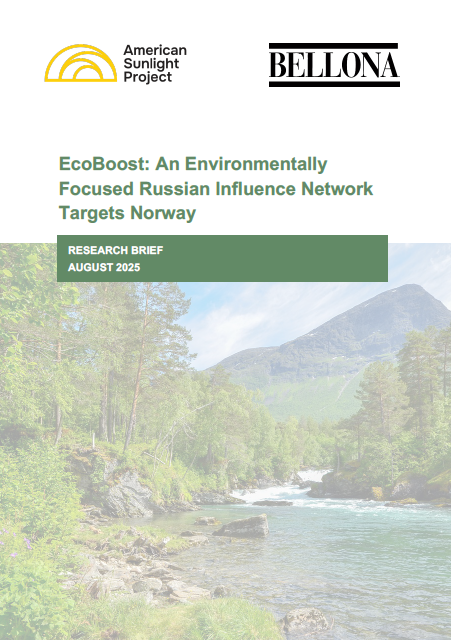
EcoBoost: An Environmentally Focused Russian Influence Network Targets Norway
The American Sunlight Project and the Bellona Foundation show in this brief how the Russian bot network EcoBoost systematically manipulates climate a...
Publication
We are pleased to present a new edition of our magazine “Environment and Rights”. This issue focuses on the Arctic, a region experiencing the fastest climate change on the planet. It is surrounded by countries with complex political relations, particularly in light of Russia’s invasion to Ukraine. This region is where various factors, such as foreign policy, economics, and the environment, intersect.
Our authors, some of whom still publish under pseudonyms for security reasons, delve into topics such as how international cooperation in the Arctic has evolved since the onset of the war, Russia’s plans for further development in the region, ongoing and planned infrastructure projects in the Russian Arctic, and the issue of the Arctic’s nuclear legacy amidst ceased international cooperation. We also explore the development of the Northern Sea Route, including concerns regarding industrial pollution and environmental risks in the region.
Climate change, both observed and predicted, remains a crucial issue for the Arctic. Our contributors have studied the latest scientific publications, analyzed existing adaptation plans for Arctic regions, as well as the strategies and actions of federal and local authorities, public organizations and initiatives. Some of these organizations have recently been labeled as “foreign agents” or “undesirable organizations” due to their active work in Arctic regions.
In this issue, we feature Dmitry Berezhkov, the first political refugee representing the indigenous northern peoples of Russia, and Udege Pavel Sulyandziga, the only foreign agent among the indigenous peoples of the Arctic. They discuss the impact of the war in Ukraine on the rights of indigenous peoples in Russia and shed light on the largest environmental protest campaigns in Russia’s Arctic regions, along with the consequences of international environmental organizations leaving Russia.
Furthermore, Katja Doose, an environmental history researcher at the University of Friborg, provides a historical overview of Arctic cooperation dating back to the 19th century. Researcher Anne Morgenstern, who specializes in permafrost issues at the Alfred Wegener Institute in Germany, shares insights into international scientific research programs in the Arctic since the start of the Russian invasion to Ukraine.
Download the PDF version of the magazine here: